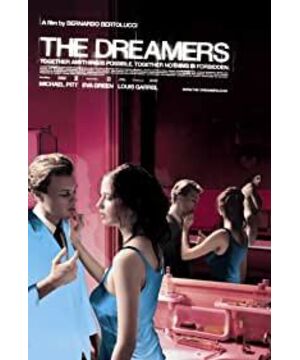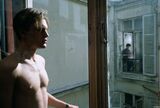In addition, the film is also a condensed semantic meditation on that era. While the shot is filled with hot sex or fiery revolutionary enthusiasm, the mind that manipulates the shot is cool and observant. Even if the final scene of the film ends on the street, it is undeniable that the three protagonists in the film are compared to the "March for Freedom" crowd in the American anti-discrimination declaration, and compared to the anarchist French "3·22" Movement participants, compared to the May "barricade night" crowd, whose thoughts were silent escapists in the riots. Beyond the wall, there is a young power that is shouting. And this "closed" interior space also conveys the message of "movement" to us.
1. An absent social intervention
The protagonist of the film chose a pair of Parisian siblings and an American student who was studying in France. When both parents went out, they gathered and lived together because of their passion for movies and like-minded people. In addition to the call of the era of "going to the street", closed love indoors and isolated living alone obviously constitute another kind of social intervention.
During the May incident, French students sloganed as follows: "We want to live a happy life, not a miserable life!", "Never work!", "The more I rebel, the more I fall in love. The more I fall in love, the more I rebel. !", "We are leading a bizarre life, we sleep, we eat, we don't touch the money, no one wants it, this is the society we have created!" … this vocal interpretation and inaction To resist is to be far removed from money and work. A big-character poster on the eve of the May Movement at the Sorbonne University clearly shows the fundamental orientation of the movement that followed: “The current revolution is not only questioning capitalist society, but also industrial society, and consumer society is destined to be violent. Damn, there will be no social alienation in the future, we are inventing an original and brand-new world, and imagination is taking power.” It can be seen that Marcuse’s thoughts deeply influenced young students, revealing “false needs” Promoted further resistance to consumption and industry outside the capitalist system: "The developed industrial society creates false demand that is not necessarily necessary for human needs through the constantly expanding market, through the ever-changing commodities, and through Colorful advertisements prove to people that these false needs are necessary for them", "Once the needs exceed people's instinctive needs and enter the psychological level, then the growth of demand may be unlimited... Existence, or in other words, man exists to consume commodities."
Therefore, the life full of survival instincts such as eating and sleeping is exactly the "strange life" recognized by the students. It makes all false desires and external guidance disappear, and gives life a fresh, primitive and independent choice. meaning. In the film, the three protagonists gradually used up their savings, and finally had to look for food in the trash without buying any more. This natural, unconscious gradient, however, reflects the process of interior resistance slowly distilling "money" out of life. Although embarrassed and decadent, the door is only a demarcation between the voiced revolution and the silent revolution. Even out of the house, it is not to find a job, but to participate in the revolution. Even if you don't walk out the door, you are not out of the movement, but you do nothing.
2. Self-concern in living space alone
From a superficial point of view, the French way of revolution is also romantic, that is, "love". In fact, in the student movement in the 1960s, the "revolutionary" approach had two sides: "calling up and down" and "silent resistance". In action, it is marching and living alone. The cold thinking in the movie just shows the actions of living alone under the same roof. The space in the film that acts as the place of "home" is particularly symbolic.
When the hippies became popular, McMetry, a middle school student in Massa Block State, first established the original gregarious village, the Leiden commune. "The group village advocates returning to the original life, implements public ownership of property, children and even sex, and pays attention to education and environmental protection.", "The group village activities continued until the late 1970s and early 1980s. The hippie movement quickly spread to Europe, and many people appeared in Europe. A village for hippies.” The American student Matthew in the film has been living in a student hotel, and the Parisian siblings have been growing up with their parents. The moment his parents traveled, the moment Matthew entered their Parisian family, an escaped "Leiden commune" and "Freedom Village" seemed to be established. In this solitary space, they mature their plans to imitate The Outlaws, they expose each other's erotic behavior unabashedly, and they discuss Buster Keaton's "egocentricity" and Charles Chaplin's They interpret the clips in the movie, connecting the current self and the utopia in their minds... In the "home" of the three, they live and immerse themselves in ideals, but do not care about the cost of survival and ideal price. They are completely open, but do not openly integrate into the social system, but construct a space that does not belong to "here" outside the order of the times.
Unlike the theoretical navigators such as Marcuse, Guydebo, etc., sober and profound, the students in the student movement do not have such high-level, far-sighted insights and reflections, and they do not even have a goal of "breaking and building". As the slogan says, what they accuse is: "Consumer society must die!", and their method is "do your own thing!". Since the 1960s, the attempts of many movements have pointed more to the unconstrained choice of self-feeling and presentness. And firm ideals and beliefs, as well as random and absurd behaviors, are the only way to build this ideal space outside of society. Even an active social activist, Brigitte Barre, the backbone of the Marxist-Leninist-Communist Youth League, once said, "When I went home, my parents and their friends asked me, what are you trying to do? What are your goals? I can't answer at all. I can't always say that I didn't know the arrested person at all, we just marched for the parade. So, I ran away." Thus, the "Leiden commune" type of behavior, both It happens in every "solitary space" that is silently resisted, and it also happens in every country where blood is boiling. It is not only a physical architectural space or geographic location, but also a spiritually self-contained utopian world and ideal home. Those who go to the street, they all collectively build a hope, displacement space, and immerse in an era that does not belong to the status quo.
3. Reflect on the danger of "living alone"
Just like the slogan of "Return to Prehistory" of the Leiden commune, all actions occur in the name of love, release and return to freedom. They are driven by feeling guided by theory. Pay attention to society. The meaning and purpose of action is to establish an existence that is isolated and beyond the existing boundaries. Therefore, this behavior is very spiritual in calm, and full of catharsis in riots.
The concept of "alienation" in Marx's "Das Kapital", the concept of "reification" proposed by Lukacs' "History and Class Consciousness", and the Frankfurt School's critical reflection on instrumental rationality all reflect the same direction-reflection on "progress". "danger. The manifestation of this danger is, on the one hand, falling back into the vicious circle of slavery, and on the other hand, the rebellion that deviates from the original intention.
This phenomenon also appeared after the student movement in the 1960s, and it was also indicated by Bertolucci in the film: three people who ran out of ammunition and lost contact with the outside world slept naked at home, their parents 's return, marked by the appearance of a cheque. A stone shatters a home window, saving three people on the verge of self-destruction, before dragging them into the flow of revolutionary waves.
Is the student movement as opposed to the reality of consumer society and the capitalist system as the famous slogan on the walls of the Sorbonne in 1968? "Students, until the last capitalist is hanged by the intestines of the last bureaucrat, human beings cannot achieve happiness!" A survey in September 1968 showed: "The main dissatisfaction of students is not the consumer society, but the existence of the consumer society. Problem. The number one reason for students' dissatisfaction is that they worry that once they finish their studies, they won't be able to find a job commensurate with their training; only 8% of students choose opposition to consumer society as the primary reason for rebellion. 20 or 30 years after the movement, after the students who participated in the movement became adults and entered the society, although the participants of that year were still full of excitement in recalling May 1968, the consumer society not only did not "have to die", but it was like Like the check in the movie, it will eventually recruit young people in the security movement. These rebels of the year will finally live according to the life they once opposed.
The resistance to violence, which extends to the reflection on exclusion, runs through the student movement in the 1960s, and it also reflects the inner mutation of this solitary space and the destructive power of idealism. The final shot of the film focuses on the clashes between students and police. And this "out-of-control" violence also appeared in the later period of the movement in the 1960s. Within a few years since 1969, the "Weatherman" organization was established by SDS in Chicago, the "Red Brigade" by Renato Curcio of the University of Turin in Italy, and the "Bader- Meinhof gang”, and the Anti-Terrorism Act passed in Rome in 1978 is a legal case in response to this series of social activities. The excessive exaltation of critical attitudes, the bad influence of radical revolution... may all be the reasons for pushing the movement to the extreme. And just like the peculiar way of life lived by the "weather forecasters", they "were very isolated from the beginning ... breaking all social and ethical relationships, abandoning family, living in groups of men and women, smoking marijuana, self-criticism every day. This kind of deviant The way of life gradually isolates the organization from the outside world, and finally closes it completely.” This kind of ideal fanaticism is precisely to create and hide in the solitary space of high self-concern. Formally, it is a continuation of the "indoor" behavior in the 1960s, but it has completely abandoned the humanitarian approaches such as "make love, not war" and "we don't want to go".
There are many brilliant slogans and slogans that emerged from the student movement of the 1960s, but the film focuses on them in very few shots. Through the disappearance of the theme, Bertolucci accurately expresses this. The characteristics of the movement - the will of the self and the goal of confusion. Such characteristics also reveal the inherent structure of the movement and the hidden danger of easy deterioration. The radicalization of "weather forecaster" self-will in 1969 can be described as the culmination of the development of violence, and the increase in the personal enthusiasm of the student movement can be counted from 1965: Mao Zedong launched a culture of "destroying the four olds" in China in 1966 The great revolution, in 1968, Sartre further advocated students' criticism and action in the Sorbonne commune... All of them produced demonstrations of action and release of ideas for students' violent actions. Although the influence of these movements and calls cannot be summed up in short, let this radical line aside for the time being and go back to the starting point of the student movement in the 1960s, which can be seen in the manifesto of the first anti-Vietnam War demonstration in the United States in 1965: "We will do what our conscience allows, and do it with all our heart and soul. We will encourage everyone in our generation to stand up against this war, rely on our conscience, and do what the law allows." This manifesto is called Build, Not Burn. This title with a strong sense of direction and sense of proportion has found a suitable name for the beautiful original intention and decent nature of the general ideal of the student movement. Interestingly, the organization that issued this manifesto in 1965, SDS, was the parent organization of the "Weather Forecaster" organization four years later. The radical turn of student organizations in the 1960s is evident from this. At the end of the film, the Paris brothers and sisters who participated in the conflict heralded the arrival of an "alienation" when their parents returned, either returning to the slavery of consumption or indulging in the catharsis of violence. The spiritual home also rebels against its own call and practice of "love".
The film captures an important slice of the decade, dreamers, delusionalists, revolutionary radicals, outsiders... These many identities are constantly changing and compatible with the three protagonists, reflecting the turbulent years of young students in the 1960s. And the ideal and longing are portrayed penetratingly. Rather than showing penetrating insights through the lens, the film is more like an observation that is not in a hurry to express one's position. Through this, we can also see a microcosm of the decade of that era: whether it is in love indoors, or burning draft cards, or refusing to join the war, Or in Leiden commune and Liberty Village, where students are silently resisting and non-participating, they let their high self-concern and personal voices of opposition create their own place through "living alone space", which has become a place for intervening in society and society. An important way to express a position. And this isolated world of self-centeredness and wishful thinking also manifests its own fragility and sensitivity. On the one hand, it is necessary to prevent external erosion in the closedness that is maintained, and on the other hand, it is necessary to prevent the extreme from going out of control in the absolute self-will.
View more about The Dreamers reviews










